Table of Contents
The single best explanation I’ve come across on the difference between pain and suffering comes from a talk that Yen Liow gave at Columbia Business School. The fundamental premise is that pain without meaning equals suffering, whereas pain with meaning equals struggle and growth.
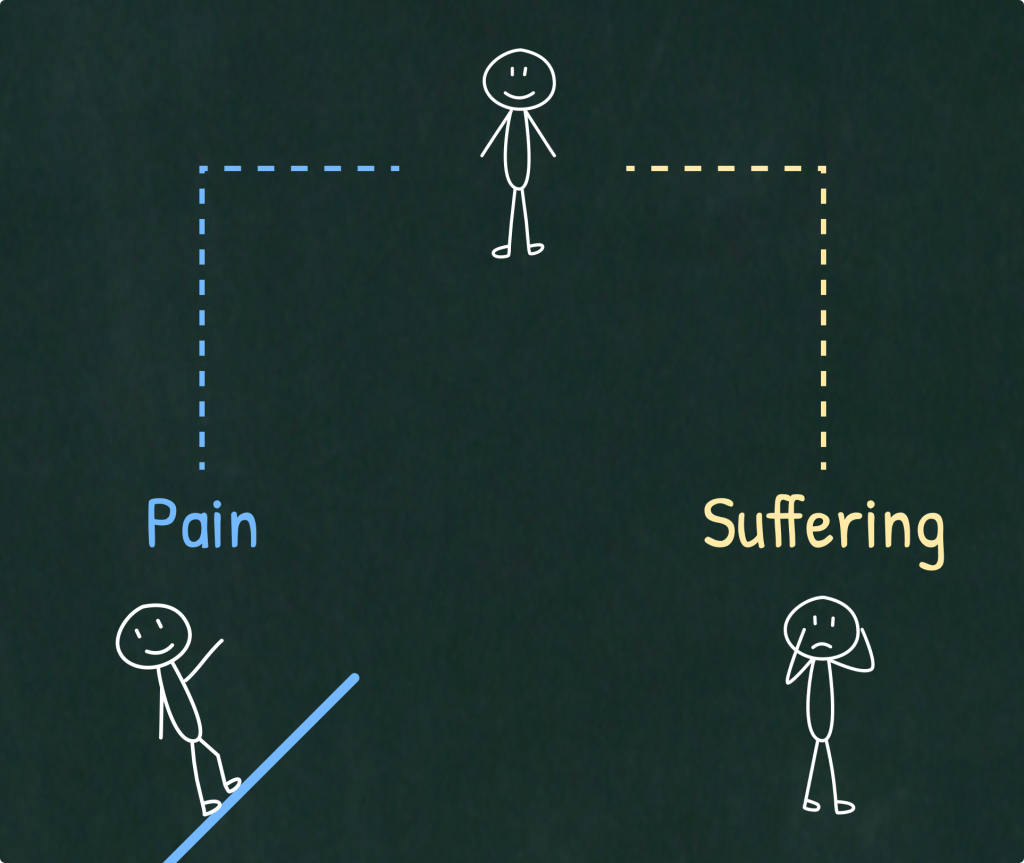
Thus, it all depends on the context:
- Pain and suffering are the same in a meaningless and hopeless context — there’s no difference.
- But pain and suffering are not the same in the context of purpose and being internally driven towards something. In this case, pain is transformation, personal growth, and an inescapable part of your journey towards a meaningful end.
Although I just explained to you the basis of Yen’s idea, I highly recommend you to read the original passage (in his own words):
I want to change your relationship with discomfort and pain.
The first point here is that everything that you seek or want from your life is just outside of your comfort zone. Otherwise, you are likely to already have it.
This aphorism is from Bruce Lee: “Do not pray for an easy life. Pray for the strength to endure a difficult one.”
“Ubantu” is a Polynesian word I wanted to share with you. [It means that] if you find your why, you will always find your how. Ubantu is your reason for being. The bigger the why, the more powerful the how. If there is no consequence to your why, you will not have good solutions. If your why is extraordinarily large, you will be more creative than any problem can overwhelm.
In the rewiring of your relationship with pain, what I’m hoping to also pass to you here is the concept of struggle — this will be your companion for your entire life if your journey is based on excellence. The easy decisions will always be passed to others. To excel, challenges will increase.
“Pressure is a privilege — it only comes to those who earn it.” – Billie Jean King (very famous tennis player)
As you are sent into higher levels of responsibility, the easy decisions should be handed to others. And henceforth, the struggle will only increase as you become more privileged in the decisions you are empowered to make.
It becomes a lot more fun when you understand that struggle is your partner in this journey, and you don’t want to be fighting it.
The difference between struggle and suffering is context. Struggling is pain with meaning. Suffering is pain without meaning. So, being able to understand the context of your pain is extremely important. It can become motivating or destroying.
If you are struggling, it means you are learning and you are growing. Don’t fight it. You have to learn to embrace it.
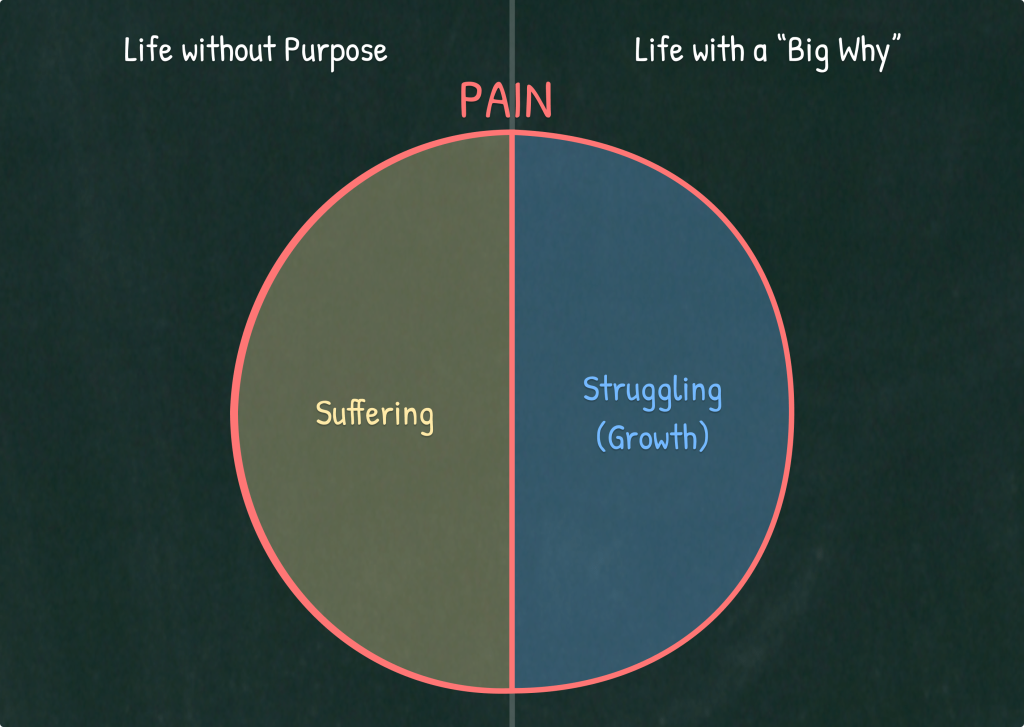
The exciting thing about understanding the difference between pain and suffering is that you can learn to detach from your physical discomfort and see it in a philosophical light. You can work on yourself to live a more purposeful and happy life. As a by-product of that, you will embrace the kind of struggle that makes you grow while minimizing suffering.
Thus, it all stems from our mindset…
“Two men looked out from prison bars. One saw the mud, the other saw stars.” – Dale Carnegie
“No pressure, no diamonds” – Thomas Carlyle
In the next sections, we will go deeper on the aspects of pain and suffering, and as we do so, we will see how to tune into the right internal context to change our relationship with pain and suffering to our advantage.
Embracing Pain
As described previously, the key to developing a capacity to endure pain is to have a big why. As Nietzsche said: “He who has a why to live for can bear almost any how.”
And the key to developing a big why is to be fully internally driven by your actions. Warren Buffet has a great line to help you realize whether you are being internally driven or not. He said:
The big question about how people behave is whether they’ve got an Inner Scorecard or an Outer Scorecard. It helps if you can be satisfied with an Inner Scorecard. I always pose it this way. I say: ‘Lookit. Would you rather be the world’s greatest lover, but have everyone think you’re the world’s worst lover? Or would you rather be the world’s worst lover but have everyone think you’re the world’s greatest lover?’
The Transformational Power of Pain
As described previously, pain has a positive transformational power if it’s in service to some objective we have. Not even so much for achieving the objective itself but for who you become in the journey. Jim Rohn captured this perfectly in one of his renowned seminars:
What I’m about to share with you changed my whole life.
Here’s what Mr. Shoaff said, “Set a goal to become a millionaire.”
And he said, “Here’s why: For what it will make of you to achieve it.”
And I got one of the greatest classes in one sentence I’ve ever received in my life.
Set a goal that will make you stretch that far. For what it will make of you to achieve it, what a brand new reason for setting goals, what an all encompassing challenge to have a better vision of the future. What for? To see what it will make of you to achieve it.
And here’s why: The greatest value in life is not what you get, the greatest value in life is what you become.
Major question to ask on the job is not, “What am I getting here?” That’s not the major question. The major question to ask is, “What am I becoming here?”
It’s not what you get that makes you valuable, it’s what you become that makes you valuable.
So Shoaff said, “Set a goal to become a millionaire, for what it will make of you to achieve it.”
Then he said, “When you finally have become a millionaire. Now,” he said, “what’s important is not the money.”
I thought, “Wow, I’ve got some more to learn.”
He said, “No, no, Mr Rohn and I’m telling you honestly, you could just give the money away.”
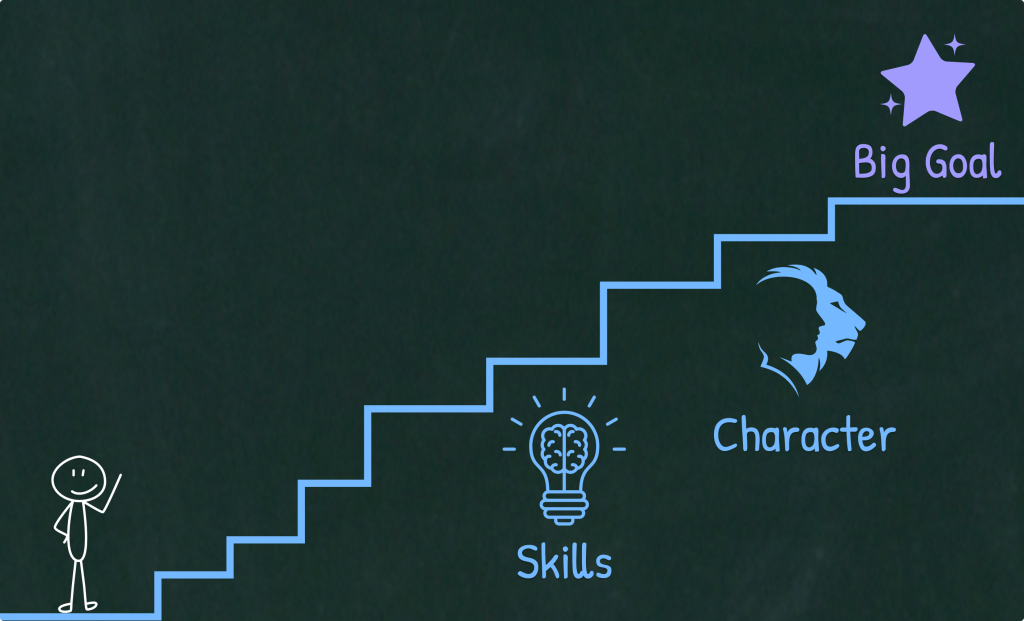
Seen in this light, it almost doesn’t matter if you don’t end up fully achieving your initial goal. If, in the process, you develop valuable skills and mental fortitude, you will be more prepared for your new goals, and you will have more opportunities than before. As Charlie Munger said, “Opportunity comes to the prepared mind.”
If I had to boil down this whole idea into one single line, I would pick this quote by Isadore Sharp, the founder of Four Seasons:
Excellence is the capacity to take pain.
[Book – Four Seasons]
Or this famous line by the renowned British explorer Ernest Shackleton:
By endurance we conquer.
Examples Of How Pain Makes Us Grow
In the world of fitness, Arnold Schwarzenegger said:
I learned that this pain meant progress. Each time my muscles were sore from a workout, I knew they were growing.
[Book – Arnold]
In the intellectual domain, Naval Ravikant (founder of AngelList) said this:
When you’re reading a book and you’re not understanding a lot of what it’s saying and there’s a lot of confusion in your mind about it… that confusion is similar to the pain / the burn that you get in a gym when you’re working out. But this time you’re building mental muscles instead of building physical muscles.
[Video – Naval Ravikant on Periscope]
On taking feedback from others, Elon Musk said:
I think it’s very important to actively seek out and listen very carefully to negative feedback. And this is something that people tend to avoid because it’s painful. But I think this is a very common mistake — to not actively seek out and listen to negative feedback.
[Video – Elon Musk and Kevin Rose]
And finally, at a more general level, Jensen Huang (founder of Nvidia) said the following in an interview at Stanford (he used interchangeably the words pain and suffering, but in this context suffering refers to the kind of pain that makes us better):
[Interviewer]:
Stanford has a lot of aspiring entrepreneurs. Students that are entrepreneurs. And maybe they’re Computer Science majors, or Engineering majors of some sort. What advice would you give them to improve their chances of success?
[Jensen Huang]:
I think one of my great advantages is that I have very low expectations. And I mean that.
Most of the Stanford graduates have very high expectations. And you deserve to have high expectations because you came from a great school. You were very successful, you’re top of your class, obviously you were able to pay for tuition, and then you’re graduating from one of the finest institutions on the planet. You’re surrounded by other kids that are just incredible. You naturally have very high expectations…
[But] People with very high expectations have very low resilience. And unfortunately, resilience matters in success. I don’t know how to teach it to you except for… “I hope suffering happens to you.”
And I was fortunate that I grew up with my parents providing a condition for us to be successful (on the one hand); but there were plenty of opportunities for setbacks and suffering… And to this day, I use the phrase “pain and suffering” inside our company with great glee. And I mean that… You know “Boy, this is going to cause a lot of pain and suffering.” And I mean that in a happy way! Because you want to refine the character of your company. You want greatness out of them. And greatness is not intelligence (as you know). Greatness comes from character. And character isn’t formed out of smart people, it’s formed out of people who suffered.
And so if I could wish upon you — I don’t know how to do it, but — for all of you Stanford students, I wish upon you ample doses of pain and suffering.
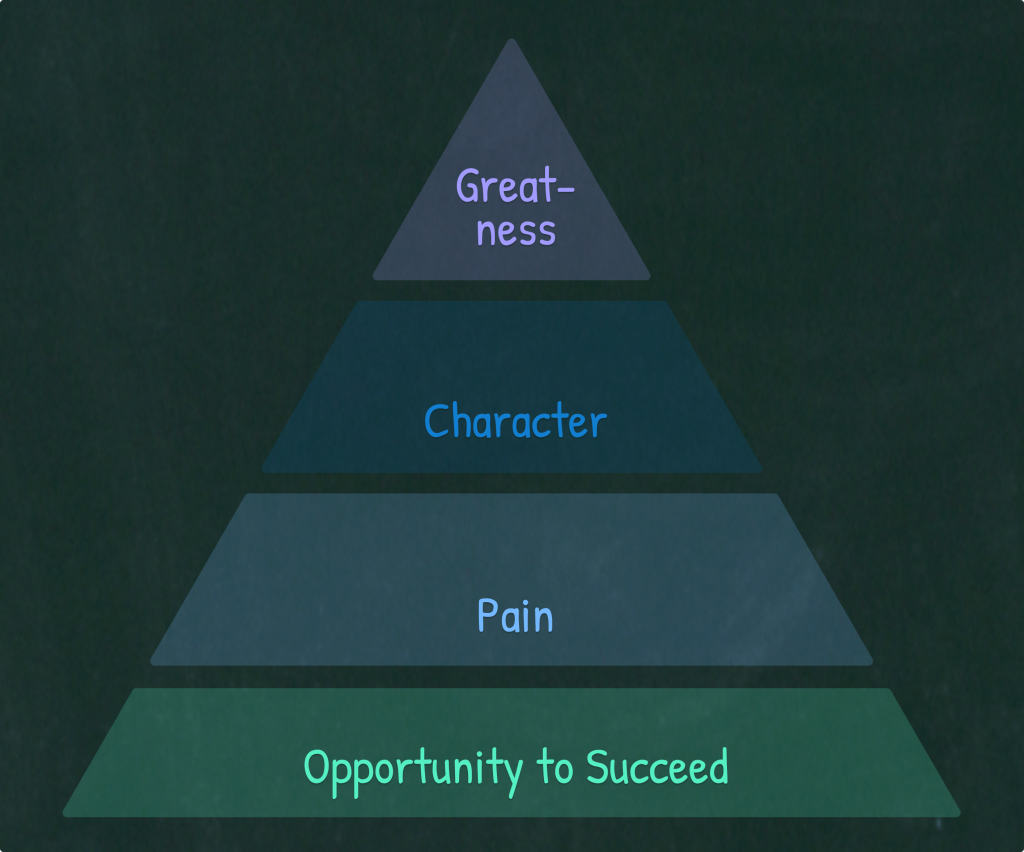
Avoiding Suffering
So far, we’ve seen the importance of being internally driven and embracing pain. Now, let’s delve into the issue of suffering, or pain, in a meaningless context.
We first need to dream and wish to get out of our comfort zone and move towards our goals and dreams. But there’s a critical difference between (1) people who wishfully want things, ignoring their reality and thus avoiding action plans, and (2) people who want something and are aware of their reality and how to move forward to achieve it.
The second kind of people are the ones who have a genuine willingness to achieve their goals — they embrace the pain that makes them grow.
The first kind of people are the ones who just complain. Because they have an idea of what they want, but they don’t know, don’t want (or don’t think they can) to take action to make what they wish to a reality. So, the only thing they will do is to complain that reality is not molding to their vision of the world. This is a state of pure suffering because there’s no path forward, and you are living and reliving the same painful experience of your expectations not matching with reality.
To break out of this suffering loop, you have two options:
1. Be happy and satisfied with your current reality.
You can forgo your desires and expectations and simply be happy with reality.
The Happiness equation is: [Happiness = ] Events minus Expectations. Every moment in your life where you felt unhappy was a comparison in your head: Events minus Expectations. If life meets or beats expectations you’re happy, if life misses your expectations you’re unhappy.
– Mo Gawdat
[Video – Mo Gawdat’s Happiness Formula]
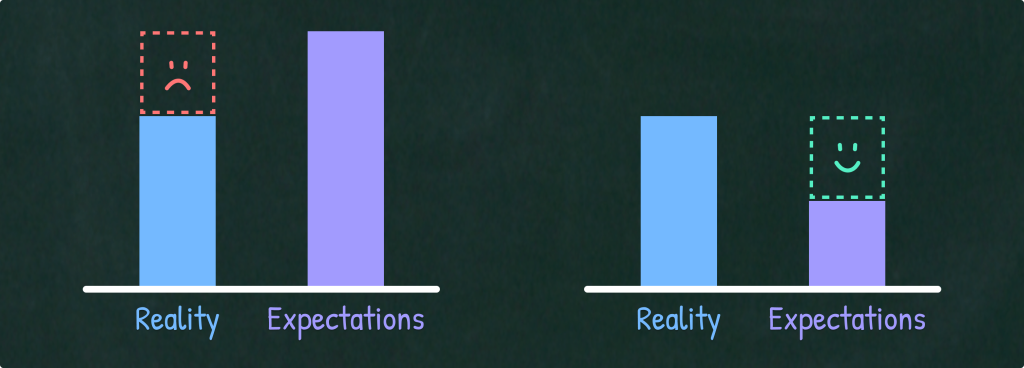
If all suffering comes from the difference between one’s expectations and experience, then having no expectations is one way to be satisfied with your current reality. There is no suffering in this scenario, but there’s also no room for the pain that makes you grow.
Personally, this is an ideal approach to get rid of all these fleeting desires that aren’t really what we want anyway (maybe we desire them because other people around us value them, but that’s not, in reality, a genuine desire). It is also the best approach to deal with the negative things outside our control, such as any random event that affects us negatively. But for the few things that (1) I genuinely want and (2) I can change, I would pick the following approach…
2. Work with reality to achieve your goals.
One definition of a moment of suffering is “the moment when you see things exactly the way they are.” This whole time, you’ve been convinced your business is doing great, and really, you’ve ignored the signs it’s not doing well. Then, your business fails, and you suffer because you’ve been putting off reality. You’ve been hiding it from yourself.
The good news is, the moment of suffering—when you’re in pain—is a moment of truth. It is a moment where you’re forced to embrace reality the way it actually is. Then, you can make meaningful change and progress. You can only make progress when you’re starting with the truth.
– Naval Ravikant
[Book – The Almanack of Naval Ravikant]
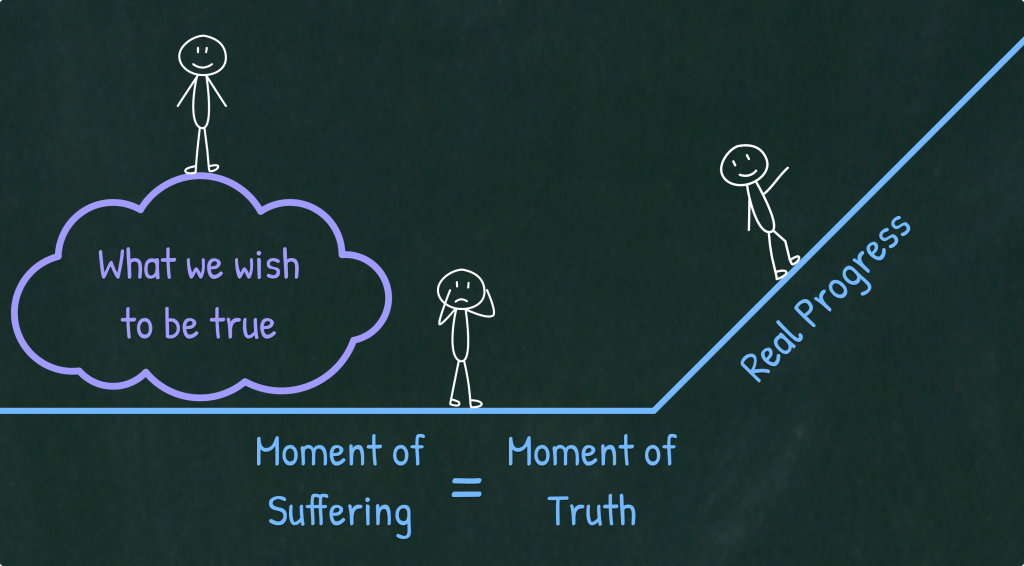
If you think wishfully and ignore reality, sooner or later, you will suffer when your expectations don’t match reality. But the moment of maximum suffering is the moment of purest truth — because you can no longer hide from reality. It is also at that moment that we have the potential to make the most progress, because we can see reality the way it is. Therefore, that moment can be the seed of change and progress (if we have a positive attitude), or it can be the seed of hopelessness and pessimism.
Everyone has a plan til they get punched in the face.
Don’t wish it were easier. Wish you were better.
– Jim Rohn
If we take that moment of truth as the seed of progress and change, we are on our way to becoming what Robert Greene calls a “realist” — which, by the way, has very little to do with the mainstream definition of being a realist.
In his book The 50th Law, Robert Greene defined and illustrated being a realist as follows:
The capacity to see the reality behind the appearance is not a function of education or cleverness. People can be full of book knowledge and crammed with information but have no real sense of what’s going on around them. It is in fact a function of character and fearlessness. Simply put, realists are not afraid to look at the harsh circumstances of life. They sharpen their eye by paying keen attention to details, to people’s intentions, to the dark realities hiding behind any glamorous surface. Like any muscle that is trained, they develop the capacity to see with more intensity.
It is simply a choice you have to make. At any moment in life you can convert to realism, which is not a belief system at all, but a way of looking at the world. It means every circumstance, every individual is different, and your task is to measure that difference, then take appropriate action. Your eyes are fixed on the world, not on yourself or your ego. What you see determines what you think and how you act. The moment you believe in some cherished idea that you will hold on to no matter what your eyes and ears reveal to you, you are no longer a realist.
To see this power in action, look at a man like Abraham Lincoln, perhaps our greatest president. He had little formal education and grew up in a harsh frontier environment. As a young man, he liked to take apart machines and put them back together. He was practical to the core. As president, he found himself having to confront the gravest crisis in our history. He was surrounded by cabinet members and advisers who were out to promote themselves or some rigid ideology they believed in. They were emotional and heated; they saw Lincoln as weak. He seemed to take a long time to make a decision, and it would often be the opposite of what they had counseled. He trusted generals like Ulysses S. Grant, who was an alcoholic and a social misfit. He worked with those whom his advisers considered political enemies on the other side of the aisle.
What they didn’t realize at the time was that Lincoln came to each circumstance without preconceptions. He was determined to measure everything exactly as it was. His choices were made out of pure pragmatism. He was a keen observer of human nature and stuck with Grant because he saw him as the only general capable of effective action. He judged people by results, not friendliness or political values. His careful weighing of people and events was not a weakness but the height of strength, a fearless quality. And working this way, he carefully guided the country past countless dangers. It is not a history we are accustomed to reading about, since we prefer to be swept up in great ideas and dramatic gestures. But the genius of Lincoln was his ability to focus intensely on reality and see things for what they were. He was a living testament to the power of realism.
Key Takeaways – Pain vs. Suffering
- In a context of meaningless, pain and suffering are exactly the same — there’s no difference.
- Pain and suffering are not the same in the context of purpose and being internally driven towards something. In this case, pain is transformation, personal growth, and an inescapable part of your journey towards a meaningful end.
- To escape suffering, you have two options:
1. Be happy with your current reality.
2. Make an action plan to achieve your dreams.
Summary Guide – How To Avoid Suffering And Get What You Want
My personal choice is to have a big why in some specific area and adopt the “realist” approach to achieving it. For the rest of my wishes that don’t matter as much to me or things outside my control, I would have low expectations so that life meets or exceeds my expectations, and I’m left happy (following the happiness equation).
By selectively choosing where to struggle and where to be happy, we can create a fulfilling, adventurous, and challenging life while also being generally happy.
If You Liked This Essay, Check Out These Sources
- Yen Liow’s Conference at Columbia Business School.
- The Snowball, by Alice Schroeder.
- Jim Rohn on Goal Setting.
- Four Seasons, by Isadore Sharp.
- Arnold, by Arnold Schwarzenegger.
- Naval Ravikant on building mental muscles.
- Kevin Rose’s interview with Elon Musk.
- Jensen Huang’s interview at Stanford.
- Mo Gawdat’s Happiness Formula.
- The Almanack of Naval Ravikant, by Eric Jorgenson.
- The 50th Law, by Robert Greene.
Adversity Quotes: Rise, Adapt and Thrive Through Life’s Struggles
Adversity is inevitable. Life throws challenges our way, often when we least expect them. It’s in these moments that resilience reveals its true power, our ability to endure, adapt, and…